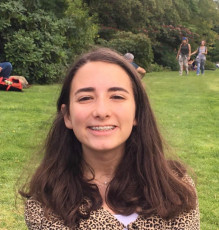Since the murder of George Floyd, the United States and the world have opened up a long overdue conversation on systematic racism and social justice. While these conversations have also been occurring recently in my own Walt Whitman High School community, we already have been grappling with these issues prior to George Floyd’s murder.
In Fall 2019, we had several racist incidents at our school. These resulted in a new initiative called One Whitman–a mandatory class held once a week that is intended to increase tolerance and decrease hate in our school community. Just one month ago, white students at my high school spray-painted a racist slur on school property–the second time this has happened at my school this year. It is extremely frustrating and saddening to me to see how my school, which is labeled as highly progressive, can be so intolerant and systematically racist.
The discourse on issues of systemic racism and police brutality occurring both nationally and within my own community has made me think more critically. The conversations on these issues may often be uncomfortable and painful, especially as those who hold privilege (like myself) are forced to account for our own privilege and understand our role in allowing systemic racism in our communities. But these conversations are necessary and overdue. As a privileged, white 17 year old girl, my role right now generally is to shut up and step back. But for the intent of this blog – here are my three suggestions for what I think my fellow white high school peers should or could be doing.
- Listen
Too many of my white peers feel the need to post on Instagram and other mediums to show how “woke” they are with performative activisim. Don’t. We need to drop the mic and get out of the way of BIPOC activists. We should prioritize giving space and access to Black voices who can talk more authentically about racism than is possible for me or most of my peers. As white people, it is our job to use our privilege and platform to amplify the messages of black voices, instead of drawing attention to our own.
- Educate
Everyone can continue to educate themselves and learn more about ways systemic racism manifests in our everyday lives. There are many anti-racist books, articles, podcasts, films, etc. A good and important use of your time could be to educate yourself and your parents. Instead of watching Hamilton over and over, watch Ava DuVernay’s film 13. I have Trevor Noah’s Born a Crime at my bedside table. The New York Times has a great reading list. Again, our education should focus on learning from BIPOC activists and educators–not white people.
- Act
Black students at my high school have started an Instagram account called @blackatwhitman, which allows black alumni and current students to share their personal experiences with racism at my school. I read and follow these posts daily. Students from my school had a protest in my community of Bethesda, and I supported it by bringing water and snacks. My sister and I put up signs on our street that advocated for justice following the murder of George Floyd. Although these have not always been popular with our neighbors, they created necessary conversations on our street about police brutality.
Like I said, it is important to avoid acting or posting simply to feel better about ourselves or present ourselves as “one of the good white people.” We should prioritize becoming actively anti-racist–even if no one else is watching. (And I recognize the irony in this statement given that I have just written a whole blog of my own thoughts on how to be a more supportive white person.) Hold your friends, family and, most importantly, yourself accountable to educating yourself and being actively anti-racist every single day.
To my fellow white high schoolers, this isn’t about us. Take the time to listen to our fellow BIPOC classmates, educate yourself and your family on our national and local history of systemic racism and act accordingly.
Posted By Grace Mcguire
Posted Jul 8th, 2020


3 Comments
Brigid Smith
July 9, 2020
Grace, I really appreciate this reflection. As a young, white woman myself, I’ve struggled with how to act/respond to racism, and I think your blog really emphasizes the importance of stepping back while still being supportive. These paragraphs are definitely making me reevaluate what I CAN do in my own community, especially when I return to a majority-white, university campus in the fall!
Alexandra Mayer
July 17, 2020
Interesting and informative post, Grace. I am sorry to hear about the racism continuing at your school. My old high school has a similar instagram account – which I think speaks to the ever presence of racism in this country. I agree with all your advice. It is necessary for us all to engage in active listening, to educate ourselves and to partake in activism at the interpersonal and macro-level. I think it is great that you mention holding your friends and family accountable. As an ally, you are able to take on some of the emotional labor inherent in the educating process. Do you think it is possible to utilize social media as a pedestal for BIPOC voices through reposting BIPOC content?
Bobbi Fitzsimmons
July 20, 2020
Grace, your three suggestions are spot on. I appreciate your perspective and find it so encouraging that young people are taking action to bring about change, not just talking about it or lamenting the current situation. It’s so trite to say, “You are the future,” but you are, and you inspire confidence that the future is in good hands.